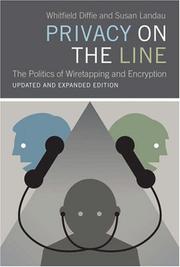| Listing 1 - 5 of 5 |
Sort by
|
Book
Year: 2007 Publisher: Adelphi, MD : Army Research Laboratory,
Abstract | Keywords | Export | Availability | Bookmark
 Loading...
Loading...Choose an application
- Reference Manager
- EndNote
- RefWorks (Direct export to RefWorks)
Radar --- Radio frequency. --- Target acquisition. --- Electronic countermeasures. --- Military applications.
Book
Year: 2008 Publisher: Adelphi, MD : Army Research Laboratory,
Abstract | Keywords | Export | Availability | Bookmark
 Loading...
Loading...Choose an application
- Reference Manager
- EndNote
- RefWorks (Direct export to RefWorks)
Radar cross sections. --- Radar --- Electronic countermeasures. --- Military applications.
Book
Year: 2013 Publisher: [Washington, D.C.] : United States Government Accountability Office,
Abstract | Keywords | Export | Availability | Bookmark
 Loading...
Loading...Choose an application
- Reference Manager
- EndNote
- RefWorks (Direct export to RefWorks)
Electronic warfare aircraft --- Electronic countermeasures. --- Electronics in military engineering. --- Radar --- Interference. --- United States. --- Weapons systems.
Book
Year: 1993 Publisher: Washington, D.C. United States. Government Accountability Office
Abstract | Keywords | Export | Availability | Bookmark
 Loading...
Loading...Choose an application
- Reference Manager
- EndNote
- RefWorks (Direct export to RefWorks)
Electronic countermeasures. --- Electronics in military engineering. --- United States. --- United States. --- Communication systems.

ISBN: 9780262256018 0262256010 9780262042406 1282096265 9786612096266 0262262517 0262514001 0262042401 9780262514002 Year: 2010 Publisher: Cambridge, Massachusetts ; [Piscataqay, New Jersey] MIT Press IEEE Xplore
Abstract | Keywords | Export | Availability | Bookmark
 Loading...
Loading...Choose an application
- Reference Manager
- EndNote
- RefWorks (Direct export to RefWorks)
Telecommunication has never been perfectly secure. The Cold War culture of recording devices in telephone receivers and bugged embassy offices has been succeeded by a post-9/11 world of NSA wiretaps and demands for data retention. Although the 1990s battle for individual and commercial freedom to use cryptography was won, growth in the use of cryptography has been slow. Meanwhile, regulations requiring that the computer and communication industries build spying into their systems for government convenience have increased rapidly. The application of the 1994 Communications Assistance for Law Enforcement Act has expanded beyond the intent of Congress to apply to voice over Internet Protocol (VoIP) and other modern data services; attempts are being made to require ISPs to retain their data for years in case the government wants it; and data mining techniques developed for commercial marketing applications are being applied to widespread surveillance of the population. In Privacy on the Line, Whitfield Diffie and Susan Landau strip away the hype surrounding the policy debate over privacy to examine the national security, law enforcement, commercial, and civil liberties issues. They discuss the social function of privacy, how it underlies a democratic society, and what happens when it is lost. This updated and expanded edition revises their original - and prescient - discussions of both policy and technology in light of recent controversies over NSA spying and other government threats to communications privacy.
Wiretapping --- Data encryption (Computer science) --- Privacy, Right of --- Law and legislation --- Electronic intelligence --- Electronic surveillance --- Telecommunication --- Political aspects --- INFORMATION SCIENCE/Communications & Telecommunications --- INFORMATION SCIENCE/Technology & Policy --- Electric communication --- Mass communication --- Telecom --- Telecommunication industry --- Telecommunications --- Communication --- Information theory --- Telecommuting --- Electronics in surveillance --- SIGINT (Electronic surveillance) --- Signals intelligence --- Surveillance, Electronic --- Remote sensing --- Electronic spying --- ELINT (Electronic intelligence) --- Intelligence, Electronic --- Intelligence service --- Military intelligence --- Electronic countermeasures --- Human rights, civil rights --- Communications engineering / telecommunications
| Listing 1 - 5 of 5 |
Sort by
|

 Search
Search Feedback
Feedback About UniCat
About UniCat  Help
Help News
News